I started to get into backend after React and on my backend server I added github OAUTH and sessions to persist the data. They are all working fine in the backend side, I can accesses the data from other handlers with sessions etc. But as soon as I try to get the session from backend with react I am never able to.
func (h Handler) HandleAuth(w http.ResponseWriter, r *http.Request) {
w.Header().Set("Access-Control-Allow-Origin", "http://127.0.0.1:5173")
w.Header().Set("Access-Control-Allow-Headers", "Content-Type")
w.Header().Set("Access-Control-Allow-Methods", "GET")
url := Oauth2Config.AuthCodeURL("state", oauth2.AccessTypeOffline)
http.Redirect(w, r, url, http.StatusFound)
}
func (h Handler) HandleAuthCallback(w http.ResponseWriter, r *http.Request) {
w.Header().Set("Access-Control-Allow-Origin", "http://127.0.0.1:5173")
w.Header().Set("Access-Control-Allow-Headers", "Content-Type")
w.Header().Set("Access-Control-Allow-Methods", "GET")
code := r.URL.Query().Get("code")
token, err := Oauth2Config.Exchange(r.Context(), code)
if err != nil {
http.Error(w, err.Error(), http.StatusInternalServerError)
return
}
// Use the access token to get the user's GitHub data
client := github2.NewTokenClient(r.Context(), token.AccessToken)
user, _, err := client.Users.Get(r.Context(), "")
if err != nil {
fmt.Printf("Error: %v\n", err.Error())
http.Error(w, err.Error(), http.StatusInternalServerError)
return
}
session, err := store.Get(r, "session")
if err != nil {
http.Error(w, err.Error(), http.StatusInternalServerError)
return
}
session.Values["user"] = user.GetLogin()
session.Values["access_token"] = token.AccessToken
err = session.Save(r, w)
if err != nil {
http.Error(w, err.Error(), http.StatusInternalServerError)
return
}
fmt.Fprintf(w, "this is authcallback: %s", user.GetLogin())
}
func (h Handler) HandleCurrentUser(w http.ResponseWriter, r *http.Request) {
w.Header().Set("Access-Control-Allow-Origin", "http://localhost:5173")
w.Header().Set("Access-Control-Allow-Headers", "Content-Type")
w.Header().Set("Access-Control-Allow-Methods", "GET")
session, err := store.Get(r, "session")
if err != nil {
http.Error(w, err.Error(), http.StatusInternalServerError)
return
}
user, ok := session.Values["user"].(string)
if !ok {
http.Error(w, "Invalid user in session", http.StatusInternalServerError)
return
}
// Set the content type header to JSON
w.Header().Set("Content-Type", "text/plain")
// Write the JSON data to the response
w.Write([]byte(user))
}
I tried many things, first I was using a different sessions library other than gorilla which was called scs and I thought maybe it was my library but it was not. And while changing the code the error I got differed but every time the backend was working just fine. On the API request from the backend sometimes I would get an empty string for data, or network error or user not found etc., but every time I checked the backend in each iteration of code backend worked perfectly fine. Here is the fetch request:
function App() {
const [user, setUser] = useState(null);
useEffect(() => {
fetch('http://127.0.0.1:3080/user', {
method: 'GET',
})
.then(response => response.text())
.then(data => {
setUser(data);
console.log(data);
})
.catch(error => console.error(error));
}, []);
[]);
return <>
<p>Logged in as: {user}</p>
<button onClick={() => window.location.href = 'http://127.0.0.1:3080/oauth'}>Login</button>
</>
}
